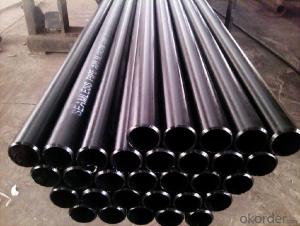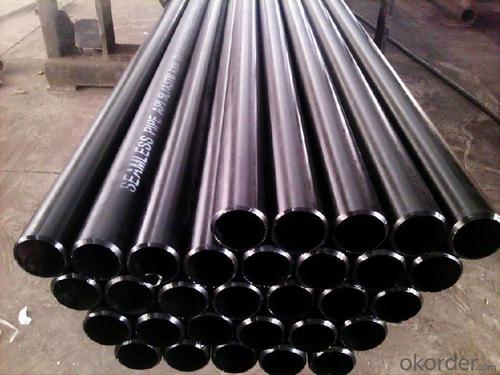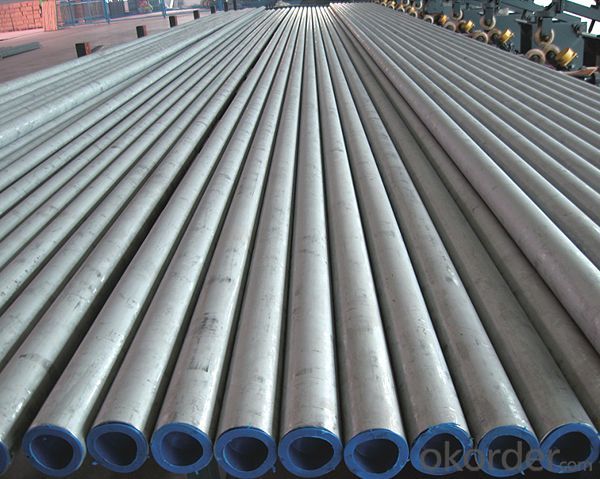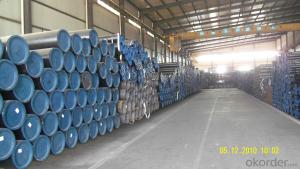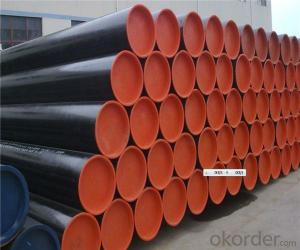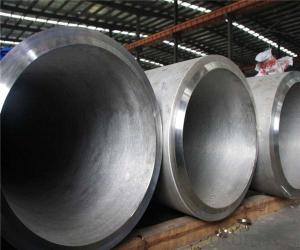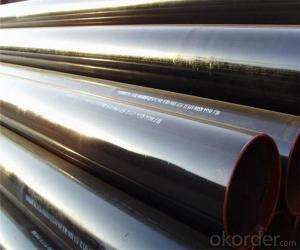Seamless Pipe from CNBM International Corporation
- Loading Port:
- Tianjin
- Payment Terms:
- TT OR LC
- Min Order Qty:
- 100 m.t.
- Supply Capability:
- 3000 m.t./month
OKorder Service Pledge
OKorder Financial Service
You Might Also Like
Product Description:
1、Structure of API Seamless Pipe from CNBM Description:
API Seamless Pipe is used for construction of long distance pipelines for combustible liquids and gases, nuclear station pipelines, heating system pipelines, general-purpose pipelines, vessels manufacturing, mechanical engineering and instrumental engineering.
2、Main Features of the API Seamless Pipe from CNBM:
• High manufacturing accuracy
• High strength
• Small inertia resistance
• Strong heat dissipation ability
• Good visual effect
•Reasonable price
3、API Seamless Pipe from CNBM Images:
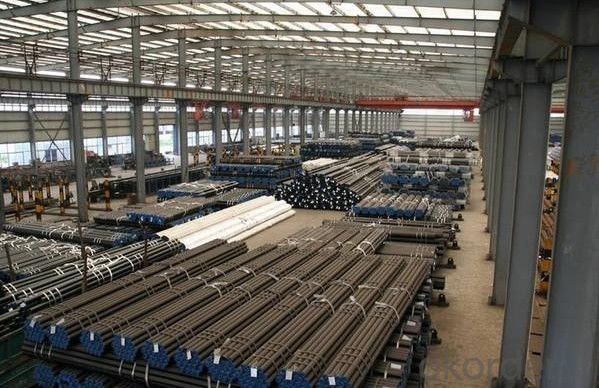
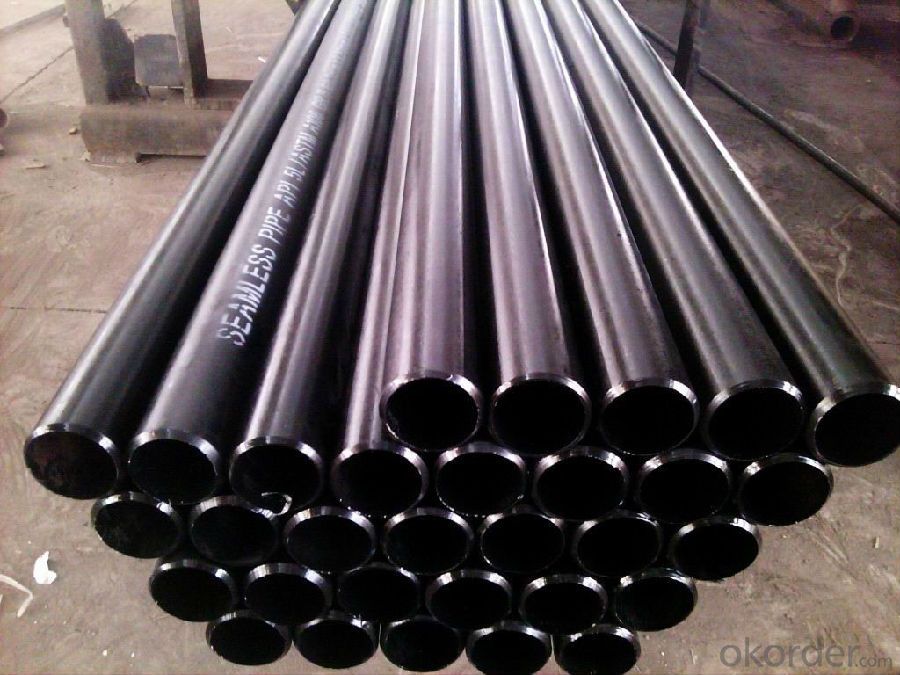
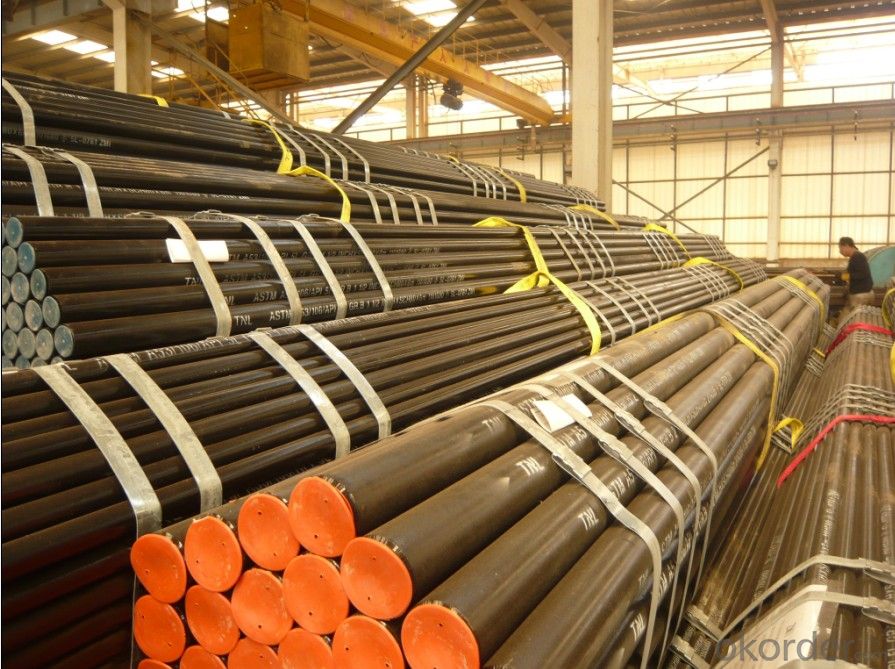
Packaging & Delivery
| Packaging Details: | seaworthy package, bundles wrapped with strong steel strip |
| Delivery Detail: | 15-30 days after received 30% TT |
4、API Seamless Pipe from CNBM Specification:
Standard: GB, DIN, ASTM
ASTM A106-2006, ASTM A53-2007
ASME, ASTMGrade: 10#-45#, 16Mn
10#, 20#, 45#, 16Mn
20#, 45#, Q345, API J55, API K55, API L80, API N80, API P110, A53BThickness: 2 - 50 mm Section Shape: Round Outer Diameter: 21.3 - 620 mm Secondary Or Not: Non-secondary Application: Hydraulic Pipe Technique: Hot Rolled Certification: API Surface Treatment: factory state or painted black Special Pipe: API Pipe Alloy Or Not: Non-alloy Length 6-12M 1.Material:20#(ASTM A 106/A53 GRB.API5LGRB,GB),45#,16Mn,10#.
2.Specification range:OD:21.3-610mm,WT:6-70mm,length:6-12m or according to the requirement of clients.
3.Excutive standards:GB,ASME API5L.ASTM A 106/A53,Despite of the above standards,we can also supply seamless steel pipe with standard of DIN,JIS,and so on,and also develop new products according to the requirements of our clients!
4.Surface:black lacquered,varnish coating or galvanized.
5.Ends:Beveled or square cut,plastic capped,painted.
6.Packing:bundles wrapped with strong steel strip,seaworthy packing.
5、FAQ of API Seamless Pipe from CNBM:
①How is the quality of your products?
Our products are manufactured strictly according to national and internaional standard, and we take a test
on every pipe before delivered out. If you want see our quality certifications and all kinds of testing report, please just ask us for it.
Guaranteed: If products’ quality don’t accord to discription as we give or the promise before you place order, we promise 100% refund.
②How about price?
Yes, we are factory and be able to give you lowest price below market one, and we have a policy that “ for saving time and absolutely honest business attitude, we quote as lowest as possible for any customer, and discount can be given according to quantity”,if you like bargain and factory price is not low enough as you think, just don’t waste your time.Please trust the quotation we would give you, it is professional one.
③Why should you chose us?
Chose happens because of quality, then price, We can give you both.Additionally, we can also offer professional products inquiry, products knowledge train(for agents), smooth goods delivery, exellent customer solution proposals.Our service formula: good quality+good price+good service=customer’s trust
SGS test is available, customer inspection before shipping is welcome, third party inspection is no problem.
Any question, pls feel free to contact us !
- Q: Can steel pipes be used for oil and gas pipelines?
- Yes, steel pipes can be used for oil and gas pipelines. Steel pipes are widely used for their strength, durability, and resistance to corrosion, making them a suitable choice for transporting oil and gas over long distances.
- Q: How are steel pipes measured and specified?
- Several key parameters are used to measure and specify steel pipes. These parameters include the outer diameter (OD), wall thickness, and length of the pipe. The outer diameter is the measurement of the pipe's outside surface from one end to the other. It is typically expressed in millimeters or inches and plays a critical role in determining the pipe's strength and carrying capacity. Different applications require different OD sizes, which can range from a few millimeters to several feet. The wall thickness refers to the distance between the pipe's outer and inner surfaces. It is measured in millimeters or inches and is crucial for determining the pipe's durability and resistance to pressure. Thicker walls can handle higher pressure, making them suitable for applications that require transporting liquids or gases under high pressure. Steel pipes are generally specified in meters or feet for their length. Standard pipe lengths are often 6 or 12 meters (20 or 40 feet), but custom lengths can be requested based on project requirements. It is important to note that longer pipes may require additional support to prevent sagging or structural issues. In addition to these primary measurements, steel pipes may also be specified based on other factors such as material grade, manufacturing standard, and surface finish. Material grade refers to the quality and composition of the steel used in the pipe, determining its strength and corrosion resistance. Manufacturing standards, such as ASTM or API, ensure that the pipes meet specific quality and performance criteria. Surface finish specifications may include factors like galvanized coating, providing protection against corrosion or other specific requirements based on the intended application. Overall, the measurement and specification of steel pipes involve considering the outer diameter, wall thickness, length, material grade, manufacturing standard, and surface finish. These parameters are crucial in determining the suitability of the pipe for various applications and ensuring its performance and durability in different environments.
- Q: How are steel pipes used in the construction of stormwater drainage systems?
- Steel pipes are commonly used in the construction of stormwater drainage systems due to their durability and strength. They are used to create underground networks that efficiently channel rainwater away from urban areas, preventing floods and water damage. Steel pipes are resistant to corrosion and can withstand heavy loads, making them suitable for the long-term and reliable functioning of stormwater drainage systems.
- Q: How are steel pipes used in water treatment plants?
- Steel pipes are commonly used in water treatment plants to transport and distribute water throughout the facility. They are used for various purposes such as conveying raw water from the source to the treatment plant, transporting treated water to storage tanks or distribution points, and carrying chemicals or additives used in the treatment process. Steel pipes are preferred due to their durability, strength, and resistance to corrosion, ensuring the safe and efficient flow of water within the plant.
- Q: What are the factors to consider when selecting pipe materials for high-temperature applications?
- When selecting pipe materials for high-temperature applications, there are several factors that need to be taken into consideration. Firstly, the material's thermal conductivity is crucial. High-temperature applications require materials with high thermal conductivity to ensure efficient heat transfer and prevent heat buildup. Materials such as copper and stainless steel have excellent thermal conductivity and are commonly used in high-temperature pipe installations. Secondly, the material's resistance to thermal expansion is important. When exposed to high temperatures, pipes tend to expand. Therefore, it is crucial to choose materials with low thermal expansion coefficients to prevent deformation and potential pipe failure. Materials like carbon steel and stainless steel exhibit relatively low thermal expansion and are suitable for high-temperature applications. Thirdly, the material's mechanical strength and resistance to corrosion need to be considered. High temperatures can cause certain materials to weaken or corrode, leading to structural failures. It is essential to select materials that can withstand high temperatures without compromising their mechanical strength or corroding easily. Materials like alloy steel and nickel-based alloys are known for their high strength and resistance to corrosion, making them suitable for high-temperature applications. Furthermore, the material's cost and availability should be taken into account. Some high-temperature pipe materials may be expensive or difficult to obtain, which can impact the overall project budget and timeline. It is essential to balance the desired material properties with the project's financial and logistical constraints. Lastly, the specific application requirements and industry standards should be considered. Different industries may have specific guidelines or regulations regarding pipe materials for high-temperature applications. It is crucial to ensure that the selected materials comply with these standards to ensure safety, reliability, and compliance with industry regulations. In conclusion, the factors to consider when selecting pipe materials for high-temperature applications include thermal conductivity, resistance to thermal expansion, mechanical strength, resistance to corrosion, cost and availability, and compliance with industry standards. By carefully evaluating these factors, one can choose the most suitable pipe material to ensure efficient and reliable operation in high-temperature environments.
- Q: How are steel tubes represented?
- If you speak of steel pipe, if it is water. Gas transmission pipe, then it is said: nominal diameter refers to the inner diameter. The units are millimeters or inches. [for example, water pipes with phi 25. It means that the nominal diameter (diameter) is 25mm (or an inch) steel pipe.
- Q: What is the maximum allowable pressure for steel pipes?
- The maximum allowable pressure for steel pipes depends on various factors such as the type of steel used, the diameter and thickness of the pipe, and the specific application or industry requirements. The American Society of Mechanical Engineers (ASME) provides guidelines and standards for pressure vessel and piping design, including the determination of maximum allowable pressure. ASME B31.1 and B31.3 are widely used codes for power piping and process piping respectively. These codes specify the design criteria for various materials, including steel, and provide formulas and charts to calculate the maximum allowable pressure for different pipe sizes and wall thicknesses. The maximum allowable pressure is typically determined based on the pipe's ability to withstand internal pressure without causing any permanent deformation or failure. It is important to note that the maximum allowable pressure for steel pipes may also be influenced by other factors such as temperature, corrosion, and the presence of any external loads or stresses. Therefore, it is essential to consult the relevant codes, standards, and engineering calculations specific to the application to ensure the safe and reliable operation of steel pipes under the given conditions.
- Q: What are the different methods of pipe repair for steel pipes?
- When it comes to repairing steel pipes, there are several methods available that depend on the severity and location of the damage. Below, you will find a list of the most common methods used: 1. Welding: This method is frequently employed for fixing steel pipes, particularly when the damage is confined to a specific area. To execute this repair, the damaged portion of the pipe is removed and replaced with a new piece that is welded securely. Afterwards, the weld is thoroughly inspected to verify its strength and reliability. 2. Pipe wrapping: This approach entails wrapping a layer of fiberglass or epoxy tightly around the damaged section of the pipe. This wrap provides structural reinforcement and effectively prevents further leakage or corrosion. 3. Pipe lining: This technique involves inserting a flexible liner into the damaged pipe. The liner is typically composed of materials such as epoxy, PVC, or cured-in-place pipe (CIPP). Once inserted, the liner is either inflated or heated to conform to the shape of the pipe, creating a new inner surface that is resistant to corrosion and leakage. 4. Slip lining: Similar to pipe lining, slip lining involves placing a smaller diameter pipe inside the damaged one. The smaller pipe acts as a protective sleeve, reinforcing the structure and preventing further deterioration of the original pipe. 5. Pipe bursting: This method is utilized when the damage to the pipe is extensive. A new pipe is pulled through the damaged one using a hydraulic or pneumatic system. As the new pipe is pulled through, it bursts the old pipe, resulting in a larger diameter pipe with minimal disturbance to the surrounding area. 6. Clamp or sleeve repair: In cases where the damage is small and localized, a clamp or sleeve can be applied to temporarily or permanently fix the issue. The clamp or sleeve is placed securely over the damaged section to prevent leakage. It is important to keep in mind that the optimal method for repairing steel pipes depends on factors like the extent of damage, accessibility, cost, and structural requirements. It is recommended to consult with a professional pipe repair specialist or engineer to determine the most suitable method for your specific situation.
- Q: How are steel pipes protected against corrosion?
- Steel pipes are protected against corrosion through various methods such as applying protective coatings, galvanizing, cathodic protection, and using corrosion inhibitors.
- Q: What are the different methods of joining steel pipes for oil and gas pipelines?
- There are several different methods of joining steel pipes for oil and gas pipelines, including welding, threading, and flange connections. Welding involves heating the ends of the pipes and fusing them together, creating a strong and durable joint. Threading is a process where the ends of the pipes are threaded and screwed together, providing a secure connection. Flange connections involve using flanges, which are flat, circular discs with holes in the center, to connect the pipes. The flanges are bolted together, creating a tight seal. These methods are commonly used in the construction of oil and gas pipelines to ensure reliable and leak-free connections.
Send your message to us
Seamless Pipe from CNBM International Corporation
- Loading Port:
- Tianjin
- Payment Terms:
- TT OR LC
- Min Order Qty:
- 100 m.t.
- Supply Capability:
- 3000 m.t./month
OKorder Service Pledge
OKorder Financial Service
Similar products
Hot products
Hot Searches
Related keywords
